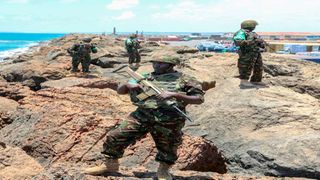
The Kenya Defence Forces will remain in Somalia despite the end of the African Union Mission in Somalia.
| File | Nation Media GroupNews
Premium
Why KDF troops won’t leave Somalia soon
The Kenya Defence Forces will remain in Somalia despite the end of the African Union Mission in Somalia (Amisom), the Nation has established.
Amisom, which has played a crucial role in stabilising Somalia for the past 14 years, is set to transition to the Africa Union Transition Mission to Somalia (Atmis) by the end of March.
Kenyan soldiers will therefore continue serving under Atmis until a clear road map for establishing long-lasting security is established in the war-torn country as it is still far from eliminating the Al-Shabaab.
“The Somali problem is complex and political in nature, clearly requiring a comprehensive and multifaceted approach and intervention to solve,” Amisom’s head of mission, Mr Francisco Caetano Madeira, said ahead of the peace keeping mission’s withdrawal from Somalia.
“Transition is a complex process. The friends of Somalia and all the stakeholders involved in helping the country recover peace and achieve reconciliation and development, must remain focused, pull together complementarily and united in their common purpose,” he explained.
Al-Shabaab threat
Kenya, which is still under an active threat from the Al-Shabaab, has not shown any intentions of withdrawing its troops from Somalia. As an indication that its troops will stay, KDF over the weekend completed its annual rotation of soldiers in Somalia, bringing in fresh boots.
Brigadier Jattani Gula has taken over from Brigadier Jeff Nyagah.
Brig Gula pledged to work with the SNA by carrying out joint military operations. “We are in high spirits and committed to achieve peace and stability in Somalia in line with the mandate of the mission,” he said.
The new troops are expected to be the first batch of Kenyan soldiers under ATMIS. Operating under a new mandate, ATMIS is expected to consolidate the gains made by Amisom from 2007 by supporting the implementation of the Somali Transition Plan (STP).
The transition plan envisages that Somali security forces will take complete responsibility of securing their country by December next year, a target security experts say is unrealistic given the political tensions in Mogadishu and the resurgence of the Al-Shabaab.
Little real positive effect
“Unfortunately, the changes to be expected seem likely to have little real positive effect,” states the Global Observatory, an international security think-tank.
“The Somali National Army remains as politicized and clan-divided as it has ever been, and at the present, little improvement seems likely in the short to medium term.”
Kenya was admitted into Amisom in February 2012, more than five months after KDF crossed into Somalia to pursue Al-Shabaab after a series of attacks and kidnappings on Kenyan soil.
KDF has about 3,600 troops, who are in charge of Amisom Sector II, comprising of lower and middle Juba. Uganda, which has the largest contributing force, has troops in Sector I, which comprises Banadir and Lower Shabelle regions.
Sector III comprises Bay, Bakool and Gedo and is under Ethiopian forces while Djiboutian troops are in charge of Sector IV, which covers Hiiraan and Galgaduud. Burundian forces are in charge of Sector V, which covers the Middle Shabelle region.
A draft Concept of Operations (CONOPs), which is set to be presented to the UN Security Council for discussion and adoption by the end of the week, has proposed an inclusion of troops from other countries.
Police and civilian components
Under Atmis, there will also be police and civilian components. Troop contributing countries must, however, agree that their soldiers will come under the full operational command of a force commander.
Amisom’s leadership has been a rotational position and to some extent the troop contributing countries have been fighting their own wars while in Somalia which has fragmented the peace keeping mission.
Under the new plan, leadership will come from the largest troop contributing country and will be appointed by the African Union in order to bring some synergy in operations.
The African Union Commissioner for Political Affairs, Peace and Security, Mr Bankole Adeoye, arrived in Mogadishu on Sunday for a series of talks with government officials aimed at reaching an agreement on how Amisom will transit to Atmis. The transition is expected to take nine months.
“Held strategic engagements with key partners of the AU in Somalia. I appreciated their various support to Amisom over the past 15 years in contributing to the overall stability of Somalia,” said Mr Adioye.
“I pressed for sustainable and unwavering financial and material support to the upcoming AU mission in Somalia; Atmis, in meeting the set benchmarks and timelines,” he added.
After the transition, Atmis and the Somali National Army (SNA) will carry out joint operations for another nine months. At this point, Atmis is expected to gradually start handing over security responsibilities to the Somali government.





